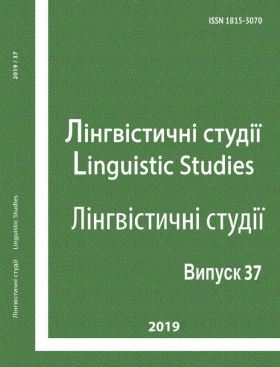Morphological Dominant of Gender and Gender Rhythm in Russian-language Poetic Texts of New Time.
DOI:
https://doi.org/10.31558/1815-3070.2019.37.4Keywords:
morphological dominant, gender category, selection, condensation of morphological form, morphological rhythm, poetic textAbstract
Nowadays the actuality of the study of morphological units functioning in the poetic speech and the investigation of the expressive potential of normative grammatical forms usage in poetic texts is determined by general anthropocentric orientation of philological researches and predetermined by the tasks of modern linguopoetics. The problem of the functioning of the same type morphological forms in the piece of poetry still remains insufficiently studied. An advanced direction of modern linguopoetics is the one that considers the phenomenon of concentration of similar morphological forms within a particular text space or its fragment and leads to the formation of the morphological dominant, by which we mean the predominant morphological form in the text and / or the grammatical meaning created by the juxtaposition of forms, which are frequent in the text and related to its content.References
Azarova, Nataliya. Yazyk Filosofii i Yazyk Poezii – Dvizheniye Navstrechu (Grammatika, Leksika, Tekst) (The Language of Philosophy and the Language of Poetry – the Movement Towards (Grammar, Vocabulary, Text)). Moskva: Logos / Gnozis, 2010. Print.
Vinogradova, Valentina. “Vzaimodeystviye Slovoobrazovaniya i Drugikh Sfer Yazyka v Poeticheskoy Rechi (The Interaction of Word Formation and Other Language Areas in Poetic Speech.)”. Osnovnyye Tendentsii Razvitiya Poeticheskogo Yazyka XX–XXI v.v. Yazykovyye Urovni i ikh Vzaimodeystviye (The Main Trends in the Development of the Poetic Language of the XX–XXI centuries. Language Levels and their Interaction.). Moskva: Izdatel'skiy Tsentr «Azbukovnik», 2015. 108–155. Print.
Dubenko, Olena. “Kontsepty «Maskulinnistʹ» i «Feminnistʹ» u Frazeolohichnykh Kartynakh Svitu Anhliysʹkoyi ta Ukrayinsʹkoyi Mov (Concepts of "Masculinity" and "Femininity" in Phraseological Pictures of the World in English and Ukrainian Languages)”. Mova i Kulʹtura (Naukovyy Zhurnal) (Language and Culture (Scientific Journal)) 15. Vol. VI (160). (2012): 208–213. Print.
Kalashnyk, Volodymyr, and Mykola Filon. “Znachennya i Smysl Poetychnoho Slova v Linhvistychnomu Vymiri (Meaning and Sense of the Poetic Word in Linguistic Terms)”. Visnyk Kharkivsʹkoho Natsionalʹnoho Universytetu Imeni V.N. Karazina. Seriya «Filolohiya» (Bulletin of Kharkiv National University named after V. Karazin. Series "Philology") 60 (1) (2010): 643–647. Print.
Kozlov, Yevgeniy. “Olitsetvoreniye v Poezii Yu. Morits i B. Akhmadulinoy (Personification in the Poetry of Yu. Moritz and B. Akhmadulina)”. Naukoví Zapiski KHNPU ím. G. S. Skovorody (Scientific Notes of KHNPU named after G. S. Skovorody) 1 (83) 2016: 89–101. Print.
Lelis, Yelena. “Grammaticheskoye Yedinstvo Khudozhestvennogo Teksta kak Sredstvo Realizatsii Yego Smyslovoy Struktury (Grammatical Unity of the Fictional Text as a Means of its Semantic Structure Implementation)”. Vestnik UdmGU (Bulletin of UdmGU) 5–4 (2012): 130–135. Print.
Lopatin, Vladimir. “Otsenka kak Ob"yekt Grammatiki (Evaluation as a Grammar Object)”. Russkiy Yazyk: Problemy Grammaticheskoy Semantiki i Otsenochnyye Faktory v Yazyke (Vinogradovskiye Chteniya XIX–XX / In-t Rus. Yaz. RAN) (The Russian Language: Problems of Grammatical Semantics and Evaluative Factors in the Language (Vinogradov’s Readings XIX–XX / Inst. Rus. Lang. RAS)). Moskva: Nauka, 1992. 70–75. Print.
Muchnik, Iosif. Grammaticheskiye Kategorii Glagola i Imeni v Sovremennom Russkom Literaturnom Yazyke (Grammatical Verbal and Nominal Categories in Modern Russian Literary Language.). Moskva: Nauka, 1971. Print.
Nikolina Natal'ya. Filologicheskiy Analiz Teksta (Philological Text Analysis): Ucheb. Posobiye Dlya Stud. Vyssh. Ped. Uchebnykh Zavedeniy. Moskva: Izd. Tsentr «Akademiya», 2003. Print.
Pavlovich, Nikolay. Slovar' Poeticheskikh Obrazov: Na Materiale Russkoy Khudozhestvennoy Literatury XVIII–XX vekov (Dictionary of Poetic Images: A Case Study of Russian Fiction of XVIII–XX centuries). Moskva: Editorial URSS, 2007. Vol. 1. Print.
Potebnya, Aleksandr. Iz Zapisok po Russkoy Grammatike (From Notes on Russian Grammar). Moskva: Prosveshcheniye, 1968. Vol. 3. Ob Izmenenii Znacheniya i Zamenakh Sushchestvitel'nogo (About the Change of Meaning and Substitutions of the Noun). Print.
Revzina, Ol'ga.”Osnovnyye Cherty Struktury Ggrammaticheskoy Kategorii Roda (The Main Features of Gender Category Structure)”. Slavyanskoye i Balkanskoye Yazykoznaniye. Problemy Morfologii Sovremennykh Slavyanskikh i Balkanskikh Yazykov (Slavic and Balkan Linguistics. Problems of Morphology of Modern Slavic and Balkan Languages). Moskva: Nauka, 1976. 4–24. Print.
Russkaya Grammatika (Russian Grammar). Edd by Vilma Barnetova, Helena Belickova-Krizkova, Oldfich Leska, Zdena Skoumalova, Vlasta Strakova. Praha: ACADEMIA PRAHA, 1979. Vol. 1. Print.
Samsonenko, Nataliya. “Morfologicheskaya Dominanta Muzhskogo Roda v Russkoy Poezii (Morphological Dominant of the Masculine in the Russian Poetry).” Russkaya Filologiya. Vestnik Khar'kovskogo Natsional'nogo Pedagogicheskogo Universiteta imeni G. S. Skovorody (Russian Philology. Bulletin of the H. S. Skovoroda Kharkiv National Pedagogical University) 4(59) (2016): 6–31. Print.
Samsonenko, Nataliya. “Morfolohichna Dominanta Poetychnoho Tekstu (Na Materiali Rosiysʹkomovnoyi Poeziyi XIX–XXI stolitʹ) (Morphological Dominant of Poetic Text (A Case Study of the Russian Language Poetry of the XIXth–XXIst centuries))”. Diss. H. S. Skovoroda Kharkiv National Pedagogical U, 2018. Abstract. Print.
Syrko, Iryna. “Katehoriya Intymizatsiyi: Tradytsiyni i Novitni Aspekty Interpretatsiyi (Category of Intimization: Traditional and the Newest Aspects of Interpretation)”. Young Scientist 4.3(44.3) (2017): 233–236. Print.
Skorobogatova, Yelena. Grammaticheskiye Znacheniya i Poeticheskiye Smysly: Poeticheskiy Potentsial Russkoy Grammatiki (Morfologicheskiye Kategorii i Leksiko-Grammaticheskiye Razryady Imeni) (Grammatical Meanings and Poetical Senses: Poetical Potential of Russian Grammar (Morphological Categories and Lexico-Grammatical Classes of Noun). Kharkov: NTMT, 2012. Print.
Skorobogatova, Yelena. “Chuzhoy Mir (Irreal'nost') i Kolebaniya Grammaticheskogo Roda v Fol'klore i Russkoy Avtorskoy Poezii Novogo Vremeni (Alien world (Irreality) and Grammatical Gender Fluctuations in Folklore and Russian Author's Poetry of the New Time)”. Literatura v Kontekste Kul'tury: Zb. Nauk. Prats' (Literature in the Context of Culture: Coll. of Scient. Works) 22(2) (2012): 273–278. Print.
Skorobogatova, Olena. Poetychnyy Potentsial Imennykh Hramatychnykh Katehoriy (Na Materiali Rosiys’koyi Poeziyi XIX–XXI stolit’) (Poetic Potential of Nominal Grammatical Categories (as a Sase of Study of Russian Poetry of the XIX–XXI centuries)). Diss. H. S. Skovoroda Kharkiv National Pedagogical U, 2015. Print.
Khaliman, Oksana. Morfolohichni Zasoby Vyrazhennya Katehoriyi Otsinky v Suchasniy Ukrayinsʹkiy Movi: Rid i Chyslo (Morphological Means of Expressing the Category of Evaluation in Modern Ukrainian Language: Grammatical Gender and Number). Diss. H. S. Skovoroda Kharkiv National Pedagogical U, 2010. Print.


